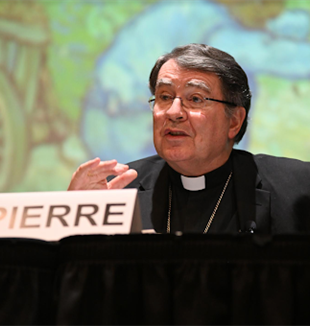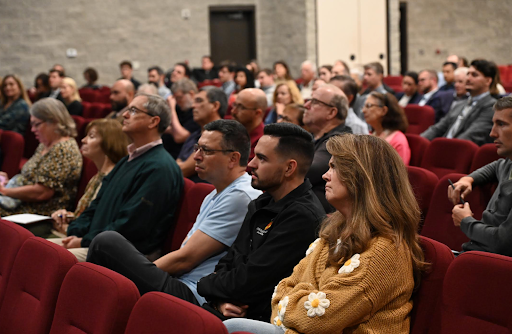
Education and the Road to Destiny
The Tampa Bay Community hosted a panel to discuss the content of The Risk of Education and saw firsthand the grace of the charism given by the Holy Spirit to Fr. GiussaniIn his letter addressed to the Movement in which he announced that he would be stepping down as President of the Fraternity of Communion and Liberation, Fr. Julian Carron wrote, “I wish you to live this circumstance as an occasion of growth of your ecclesial self-awareness, to be able to continue to witness the grace of the charism given by the Holy Spirit to Fr. Giussani, which makes Christ a real, persuasive and determining presence, which has hit us and drawn us into a flow of new life, for us and for the whole world.” Before that, he encouraged all those who follow the Movement “to take personal responsibility for the charism.” This call has been repeated and intensified by Davide Prosperi.
As those of us in the Tampa Bay community grappled with what this means for us, we found ourselves struck as we sat in St. Peter’s Square on the occasion of the 100th anniversary of Fr. Giussani’s birth. Pope Francis reminded those gathered of the power of Fr. Giussani’s witness: “Fr. Giussani was a father and teacher, he was a servant to all the human anxieties and situations that he encountered in his educational and missionary passion.” At the end of his speech, he encouraged us to “[l]et this holy prophetic and missionary restlessness burn in your hearts.”
We returned home with many questions: What does it mean to take personal responsibility for the charism? How do we grow in ecclesial self-awareness? And what does the Holy Father’s call to embrace Fr. Giussani’s missionary passion have to do with us? As we allowed ourselves to be confronted by these questions, an path for discovering the answers began to unfold in front of us.
It became clear that the most compelling thing we have to share with others is our experience. And a fact easily recognizable from the start was the number of educators in our local community. Our conversations turned to Fr. Giussani’s work, The Risk of Education, which was already an important reference point, especially for those of us involved in education.
With a concrete proposal agreed upon, we set out to put flesh on the bones of our idea… literally! We decided to invite people with a variety of perspectives to participate in the forum. Assembling a panel was an exciting process. We immediately knew Audrey from our community, and Eddie from the Miami community, were perfect candidates to share their experiences. We also invited the principal at St. Petersburg Catholic High School, Ross, who also generously hosted the event at his school. To round things out, we invited our friend Holly, assistant superintendent for academics in Columbus, Ohio, who had participated in events like this before. Wanting to be full participants in the event ourselves, we decided to study the book together with the panelists in the weeks leading up the presentation.
We initiated the book study over zoom spread across about 6 weeks, inviting the guest speakers and anyone else in the community that was interested. Our calls regularly had 12-15 participants, consisting of parents, teachers, priests — most of whom had never even opened the text. Holly, despite having studied it intensely many times before, expressed surprise at the level of interest within the community, and delight at rediscovering the value of the text through the lively questions and discussions.
The forum itself was truly beautiful. Following Bishop Parkes’ welcome and introduction, Cardinal Pierre spoke passionately about the need for parents, teachers, and priests to be masters – authorities – capable of transmitting the tradition passed on to us. “Educators and parents need to become an authority of traditions for the younger generation, to present the meaning of life with authority, not in a dogmatic and authoritarian manner, mainly by the power of their convictions.”
Audrey spoke candidly about her work at the all-boys Jesuit High School where she encourages the students to verify the elements of her theology class according to what corresponds to the human heart, noting that this verification is a continuous problem. Eddie, a principal in a Miami public high school, spoke about training his teachers and staff to embrace the students’ humanity, creating a place where the students know “someone is waiting for you.”
Ross, the principal of the host Catholic high school and the sole panelist who had never read any works of Fr. Giussani, until the invitation to participate, expressed surprise to see the text articulate his own experience from 20 years ago, in which a friend provoked him to make the faith his own. He found the work so valuable that he intends to study the book again with his leadership team at the school.
Holly drew on her extensive studies on Fr. Giussani’s pedagogy to punctuate the evening by revealing the beautiful meaning of authority in the work of teachers and parents, stating that an authority causes one to grow, and is not associated with power as we so often think today. “If we meet somebody who clearly feels and understands our experience, our suffering, our needs, our expectations, we are naturally led to follow that person because an authority is attractive to us.”
We devoted our School of Community following the event to sharing our judgments and observations from the entire work of the event — planning, studying the book, inviting people, and participating in the event itself. Audrey was moved to see how what seemed like such little effort on our part was multiplied. The hundred-fold was made possible by Someone among us. In other words, our ironic attempts to build something bore fruit that surpassed anything we could have done on our own.
We arrived at an important realization with regards to the coordination of all the details of the event. From taking care of the table cloths on the tables, to manning the book and registration tables, to the creation of the flyer, each and every one of us acted not out of obligation, but out of a sense of belonging and gratitude. This demonstrated a desire to share what we have received, in whatever way possible. In doing so we were not only taking personal responsibility for the details of the event, but for the charism we have been given.
The presence of Cardinal Pierre was a great sign to all of us. One of the guests remarked that in him you could truly see “a man who is in love.” He affirms our path and affirms Pope Francis’ encouragement. For Fr. Ralph this was a reminder of the need to see what has been handed on happening before our eyes, here and now. In particular, the presence of the Nuncio and his paternal gaze provided an opportunity to verify again this belonging both to the Movement and to the Church.
Lizzie pointed out how the Cardinal and Bishop really helped her to see the whole event as a complete instance of the Church – a microcosm: charism and institution, lineage to Pope Francis, the role of the laity. This demonstrated that we belong to something beyond our own measure. We belong to the Church, both local and universal. In addition, the fact that our initiative was the fruit of the audience with the Holy Father points to this reality, as well. This represented a significant step in our growth in ecclesial self-awareness.
What do all these facts point to? The Bishop’s support, the Nuncio’s enthusiasm, the principal’s discovery, the personal responsibility for the charism demonstrated by the community, the 150 people in attendance on a Wednesday evening. First, He is here now, among us. We saw firsthand how the grace of the charism given by the Holy Spirit to Fr. Giussani, “makes Christ a real, persuasive and determining presence, which has hit us and drawn us into a flow of new life, for us and for the whole world,” as Fr. Carron reminded us.
Second, we verified that the work was foremost a grace for us. By risking to proclaim the great gift given to us, we witnessed a profound unity and communion. As a result, our awareness has changed and the evidence is the desire to look upon all we do, both individually and as a community, with this same freedom to risk everything.
The Tampa Bay community